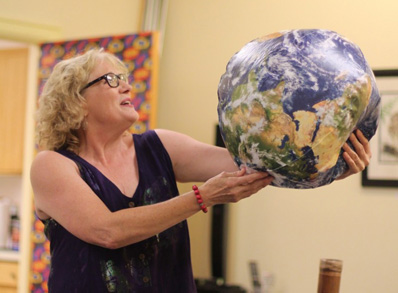Guidelines for Using Earth Mama’s Music

Rouse House Music, (ASCAP), is the music publisher for all Joyce Rouse’s songs. Please respect applicable law as regards to reprinting lyrics or using audio recordings for anything other than personal use. Out of fairness for the livelihood of all musicians you are asked to refrain from creating unauthorized audio copies of CDs.
If you are intending to reprint any of Joyce Rouse lyrics for liturgical celebrations, retreat programs, songbooks, magazines, books, bulletins, or other printed material, permission or notifying the publisher (Rouse House Music, LLC) is appreciated.
The purchasing of a “One Time Use License” or an “Annual License” is necessary for the reprinting of Earth Mama’s music. A “Synchronization License” is required when using the audio version of a song for any PowerPoint or video presentation including your website or YouTube Channel. Please contact us at 276-773-9999 or joyce@earthmama.org and we will gently walk you through the process.
If you want to make your own recording of any of Earth Mama’s songs, a written request, including a description of your project, is requested. In this case, a “Mechanical License Agreement” will be sent to you. A “Master Recording License”, is required when a prerecorded Earth Mama/Rouse House Music song is being used for any film, DVD show, or other sound recording project.
Please plan on 30 days for processing any license. A rush charge may be added for quick turnaround.
Thank you in advance for being responsible in this matter.
Trademark & Copyright Info
There’s much to learn when you start a business. When I began to compose music, record, release CDs and perform in the 90s, both the publishing world and the music industry were much less complicated. I listened to some good advice and I registered my trademark, Earth Mama, in the first years of my business. I have the legal standing to defend my trademark and copywritten materials because of the actions I took to protect it.
Trademark registration and copyrights require time and documentation. The investment I have made through the process has strengthened my business and allow me to maintain a brand identity that can be trusted by consumers of my products. As my business grows, adding new products and services, each area maintains the Earth Mama trademark, my seal of quality and commitment.
Fast forward to 2012 and beyond, and I’m more grateful than ever that I took those steps. For anyone considering launching a business, publishing original content in any form or creating a brand that represents products or services, learning how to protect your creation is essential. In an effort to pass on the kind advice which was shared with me, below you will find links to learn more about trademarks and copyrights.
What is a trademark?
http://www.uspto.gov/trademarks/index.jsp
“A trademark is a brand name. A trademark or service mark includes any word, name, symbol, device, or any combination, used or intended to be used to identify and distinguish the goods/services of one seller or provider from those of others, and to indicate the source of the goods/services. Although federal registration of a mark is not mandatory, it has several advantages, including notice to the public of the registrant’s claim of ownership of the mark, a legal presumption of ownership nationwide, and exclusive right to use the mark on or in connection with the goods/services listed in the registration.”
The United States Patent and Trademark Office
http://www.uspto.gov/trademarks/basics/
What is copyright?
http://www.copyright.gov/help/faq/faq-general.html#what
“Copyright is a form of protection grounded in the U.S. Constitution and granted by law for original works of authorship fixed in a tangible medium of expression. Copyright covers both published and unpublished works. Copyright, a form of intellectual property law, protects original works of authorship including literary, dramatic, musical, and artistic works, such as poetry, novels, movies, songs, computer software, and architecture. Copyright does not protect facts, ideas, systems, or methods of operation, although it may protect the way these things are expressed.”
US Copyright Office
http://www.copyright.gov/






